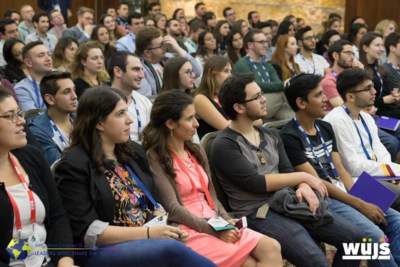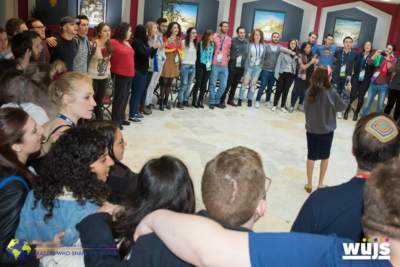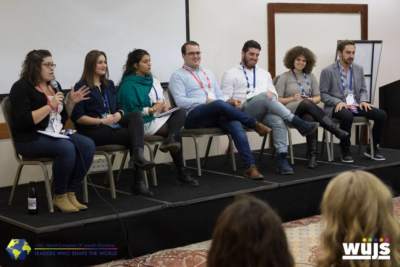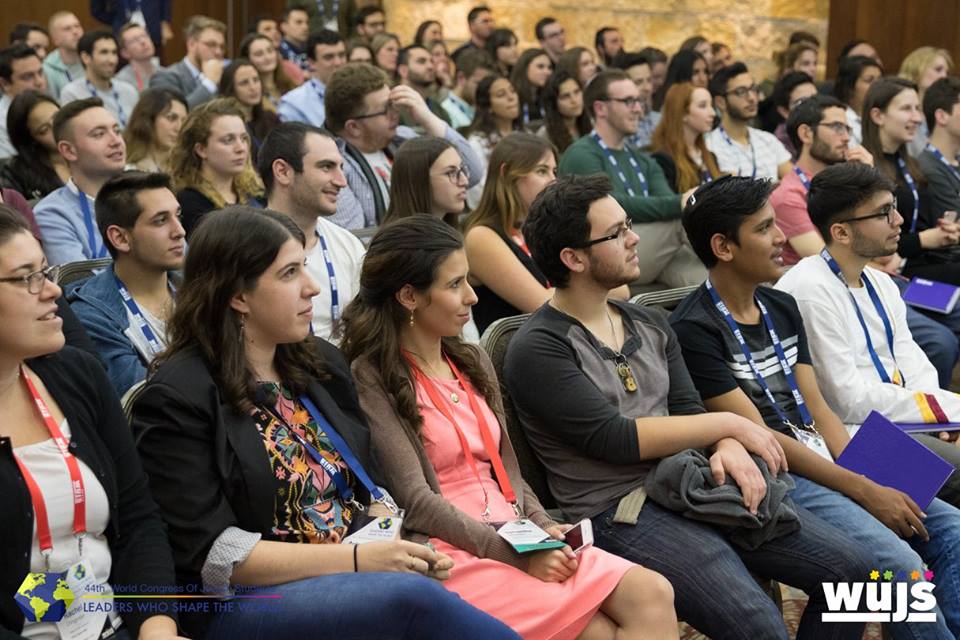I never knew that a world union of Jewish students existed, let alone the World Union of Jewish Students, until only a few months ago.

My Jewish campus worldview was shaped by my time involved in Hillel and Chabad, with the assumption that because both the organizations are international, Jewish life at universities worldwide must revolve around them. I also assumed that after a century of European Jewish life ravaged by the Holocaust and Communism, and Sephardi and Mizrahi Jewish life largely pushed out of the Middle East and North Africa to Israel, the Jewish “Diaspora” essentially meant America.
From such a narrow view, I was ill-equipped to understand what this “World” Union of Jewish Students was – or where exactly in the world there existed enough Jews to make it happen. Nevertheless, there I was, standing in the Leonardo Hotel in Jerusalem on December 28th for the first day of the WUJS Congress, where 165 delegates from 36 countries were present. Throughout the day, I met Jewish students quite literally from all parts of the world: India, Turkey, Macedonia, Mexico, Chile, Moldova, Israel of course, and more.
The first shock I had was a conversation with members of the Australasian Union of Jewish Students. My initial internal reaction was, “What?! There are Jews in Australia and New Zealand?” I had a similar experience when I introduced myself to the two Indian Jewish delegates from Mumbai, India. A 2,000-year-old Jewish community largely off the radar of Jews in the U.S., Indian Jews are still thriving, they told me, bringing Jewish students together to celebrate Shabbat and support good causes, like raising money for children in poverty.

I also chatted with delegates from Ukraine and Moldova and asked about Jewish life in Eastern Europe, specifically given the civil war in Ukraine. They told me, smiling, that Jewish life was thriving with many youth groups, summer camps, and programs up and running. This was in stark contrast to the impression I had from my parents and American news that Jewish life in Europe, and particularly Eastern Europe, was forever decimated by the Nazis and the Soviet Union.
But the biggest bombshell was a panel on the state of the Jewish world with representatives from Jewish student unions of South Africa, America, Australasia, Europe, the UK, and Latin America, mediated by the assistant director of Penn State Hillel, Rachel Dingman.
Over the course of the panel, topics ranged from the challenges and accomplishments of each student union to how young Jews engage with Israel, Judaism, and anti-Semitism. I was shocked to hear familiar campus Jewish life issues that I had once thought of as distinctly American.
For example, Jewish student leaders spoke about striving to work with other campus communities, and the challenges they sometimes face. Rachel Raff, the chairperson of the South African Union of Jewish Students, talked about wrestling with her country’s Apartheid history in creating coalitions between communities. “The majority of Jews in South Africa are predominantly white,” she said. “So, if you try to get involved in student politics, especially like progressive Jewish students, [it’s said] we’re using [Black] students and manipulating them as a means to an end. And that causes a lot of Jewish students to be pushed out of dialogue.”
Raff said SAUJS is trying to educate campuses about tikkun olam “to spread that awareness that Jews in South Africa – we’re not just here to be self-serving, we really care to uplift our community. And not just the Jewish community but the broader South African community.”
Ariel Bohorodzaner, president of the Federación de Jóvenes Judíos de Latinoamérica (Federation of Young Jews of Latin America), echoed this point, describing a diversity and inclusion focused film festival put on in collaboration with an LGBTQ+ organization in Chile. “We showed people that Jews are involved and care about civil rights,” he said. “We care about what goes on in society, not only the community.”

Student leaders also discussed the apathy many young Jews feel towards campus Jewish life. “We have a lot of Jewish students who went to Jewish schools, and they find that once they progress from high school they don’t want to continue being involved in the Jewish community,” said Gareth David Milner, national vice chairperson elect of the Australasian Union of Jewish Students. He called this trend “being Jewed out.”
He emphasized that AUJS was working to remind the Jewish community that “staying involved is really important” because “being a Diaspora country is just as important as living in Israel at times.” This last sentence was met with snaps of agreement and a few woos from congress members.
I was caught off guard by such unabashed Diaspora Jewish pride, as it was unlike anything I’d openly seen in America, especially from a student leader. To me, American Jewry had always felt caught in Diaspora shame, as if its Jewish importance paled in comparison to Israel, and simultaneously apologetic to an American audience that prizes universalism over particularism.
WUJS stood tall and proud as a Jewish force outside of Israel, honest about the challenges facing Jewish life today and rising to the occasion with incredible student leadership. Panel members told stories of hard work put into public campaigns and political activism, rooted in the conviction of what it means to be a Jew today.
At the same time, WUJS also stood tall and proud inside of Israel – not only by having the National Union of Israeli Students as a member union, but also by inviting all Jewish students around the world to be involved in discussing the complexities of the Jewish State.
An exhilarating example of this was articulated by outgoing WUJS chairperson, Yos Tarshish, who made aliyah from the UK in 2014. During the evening panel, he unapologetically roared, “Those of you who are Jews living in the Diaspora, it is not your role to defend the actions of the Israeli government. At all! …If you can’t think of one thing that you absolutely hate about this place, then as far as I’m concerned you’re part of the problem.” Rolling through a host of Israeli issues, from the Orthodox Rabbinate and government corruption to the expulsion of African refugees, he concluded, “You as young Jews, you have a role here. You have a voice here, and your voice can be WUJS.”
After talking with Jews from so many communities I thought faded into history, as well as hearing from the panelists, I realized how limited my worldview was. Not only were there thriving Diaspora Jewish communities outside America, but WUJS held a strength of vision about the role of Diaspora Jewry that the American Jewish community lacks, despite similar goals and challenges on and off campus.
It also led me to a realization: Beyond the simple recognition that other Jews deserve a seat at the table by virtue of their existence, American Jewry can’t speak for the Diaspora because it doesn’t have a confident ideal for Diaspora Jewry – whereas WUJS very much does.
American Jews benefit from the assumption that the rest of Diaspora Jewry is largely gone or too weak to have a standing in the tug-of-war with Israel over the future of the Jewish people. When we assume other countries are a Jewish vacuum, it legitimizes American Jewry as the sole voice of the Diaspora and creates an echo chamber where American issues are always at the forefront. The same American Jewish perspectives vie for center stage, and U.S. Jews bicker down a rabbit hole, supposedly representing world Jewry.
There is a reason the American Jewish community is such a strong force; almost half of all Jews live in America. But if we talk about worldwide Jewish diversity in terms of leadership and ideas, rather than population statistics and donation sizes, American Jewry looks far less fit for its current role as spokesperson, CEO, chair, and board of Diaspora Jewry. WUJS, through its global perspective, clarity of vision, and strength of leadership, looks ready for the job.
Now, with WUJS back on its feet and growing, American Jewry should take notice, make space, and get to know these Jewish student leaders. There is so much to learn from our family around the world, and it’s time that we stop acting as if they are destitute, dying, and unable to advocate for a strong vision of world Jewry. When it comes to facing campus challenges and struggles in Jewish life today, this should bring us hope and reinvigorate us that we are not alone.
Lev Gringauz is studying journalism at the University of Minnesota.

